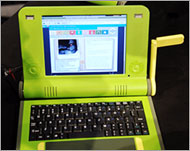Net summit puts focus on censorship
A United Nations communications and technology summit, which ended on Friday with a pledge to expand the availability of the internet, has turned the spotlight on censorship.

“The objective of this summit is to have an equitable information society where everybody can have access to information, can create information” and also disseminate it, said Yoshio Utsumi, head of the UN’s International Telecommunications Union (ITU).
Chinese vice premier Huang Ju told the World Summit on the Information Society that some internet restrictions were warranted to protect the state, although China wanted to “guarantee freedom of speech”.
“For the internet, we need effective measures to fight against criminal acts using this technology as well as economic fraud, violence, terrorism and anything that harms state security,” he said.
Freedom of speech
China recently obliged internet search engine Yahoo! to hand over data that would allow it to track down a journalist who was critical of the authorities.
Opening the summit last Wednesday, Tunisian President Zine el Abidine Ben Ali also denounced the use of the internet in a manner that “shook confidence and created a credibility problem”.
 |
|
Some experts warned against |
He cited encouragement of hatred, terrorism, crime and “the illegitimate propagation of false information”.
But Nobel peace prize laureate Shirin Ebadi, who was invited to the summit as a representative for civil society groups, used her keynote speech to launch a warning about the dangers of censorship.
“Certain governments in the name of national security, combating moral corruption … install filters to the internet … preventing people from having access to the information they need and to have their voice heard outside,” the Iranian lawyer and activist said.
“Even worse, they tend to suppress authors who express any kind of criticism of their governments,” she added, calling for a UN-supervised committee to monitor such suppression.
‘Enemies of the internet’
The French press freedom group Reporters sans Frontiers (RSF) unfurled a banner at the summit condemning 15 countries labelled “enemies of the internet”.
“We wanted to show the black holes of the web,” said RSF spokesman Jean-Francois Julliard, underlining the power that authorities have over internet access providers.
|
“We wanted to show the black holes of the web” Jean-Francois Julliard, |
The group listed Belarus, China, Cuba, Iran, Libya, the Maldives, Myanmar, Nepal, North Korea, Saudi Arabia, Syria, Turkmenistan, Tunisia, Uzbekistan and Vietnam.
However, Nart Villeneuve, a researcher at the University of Toronto, Canada, said filtering could be achieved with widely available, legal software that blocked certain keywords.
Filtering techniques used against paedophilia, terrorist groups or incitement to violence could inadvertently have a wider impact, he said.
Information society
Villeneuve highlighted the case of a website devoted to a French skier called Richard Gay, saying it was not accessible in Tunisia because of his surname.
“Tunisia’s case illustrates the growing contradiction between principles of freedom of expression highlighted by decision makers and the reality of censorship in the world,” he said.
Utsumi said: “Some countries may be lagging behind in what we are expecting … but our objective is the free flow of information.”
“Only with this will we be able to create the information society,” he added.
Qatari website honoured
Also at the Tunisia summit, Islamweb was nominated the best Arabic website in e-education and e-learning in a global competition for electronic content, the website said in a statement.
The World Summit for Electronics (WSA) awarded the Islamic website a special mention for e-learning, according to the WSA’s website.
Islamweb, part of the Ministry of Endowment and Islamic Affairs in Qatar, received the award for electronics at the summit.
Islamweb, founded in 1999, offers web pages in Arabic, English and French.